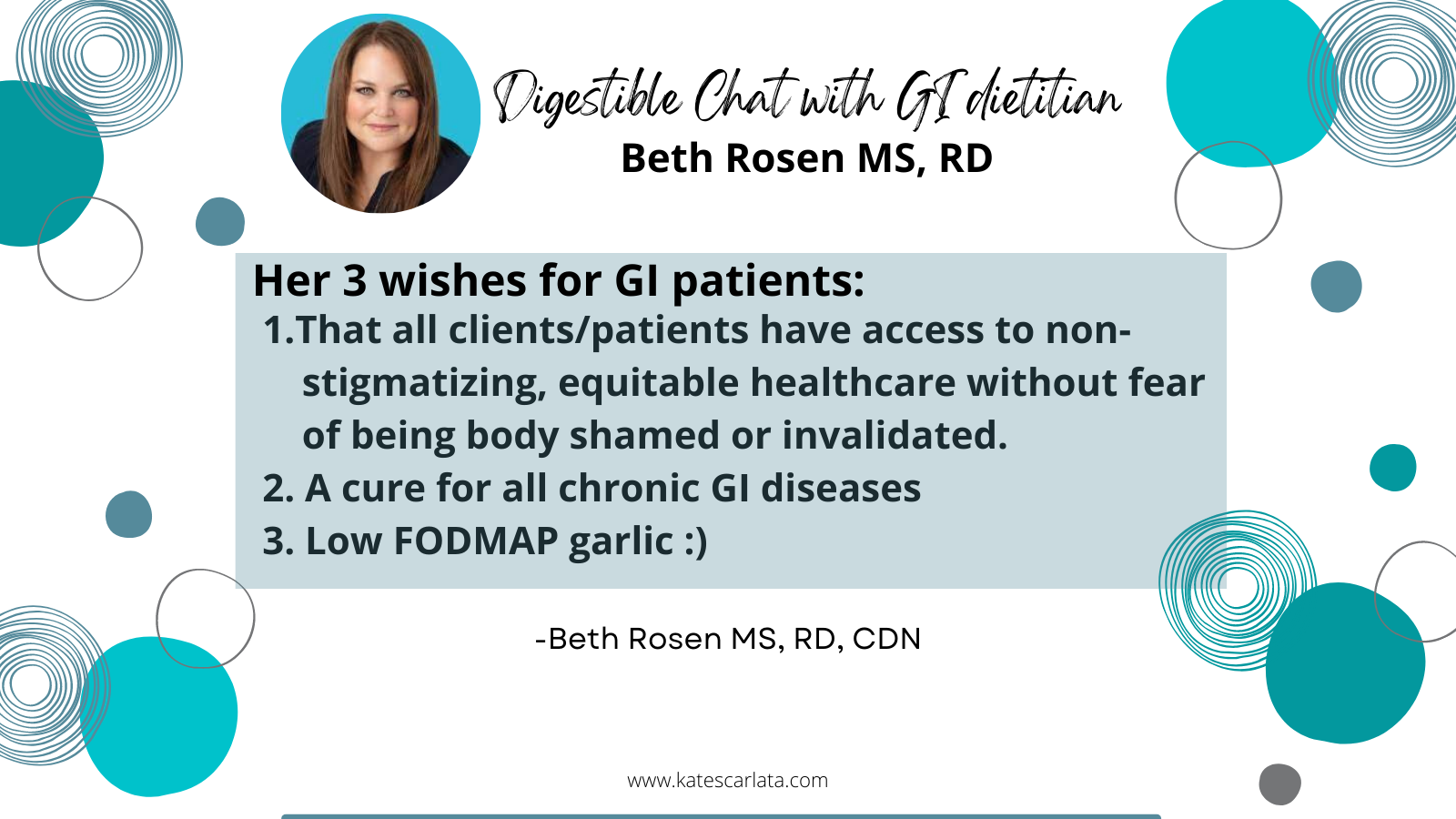Today, I am excited to introduce to you another one of my GI dietitian colleagues, Beth Rosen MS, RDN. Beth is a leader in weight inclusive approaches in GI care. I appreciate Beth’s thoughts and perspective in nutritional therapeutics. Together we will learn from Beth, her approach to GI nutrition interventions along with her 3 wishes for those with GI disorders, in this brief digestible chat.
First, a word about Beth. Beth Rosen is a Non-Diet Registered Dietitian, practicing nutrition for gastrointestinal disorders and disordered eating issues from a Health At Every Size® approach. She is the owner of Beth Rosen Nutrition in Southbury, Connecticut. She works with clients virtually either by phone or video.
She is also a fellow dog lover. And I love this picture of Beth and her pup!
So, let’s get started with the interview…
Kate: will you share with my audience the work you do as a GI dietitian?
Beth: I am a weight-inclusive RD working in a virtual private practice out of CT. I see clients by video and by phone and work with people of all ages and all GI diagnoses. My real area of expertise is working to repair my clients’ relationship with food and their bodies, with or without a GI disorder. You can find me at www.BethRosenRD.com or on Instagram and Twitter at @BethRosenRD.
Kate: I appreciate the awareness you have contributed about weight stigma and weight bias. Can you explain these terms and their impact on health & well-being, especially for the GI patient?
Beth: Weight stigma is defined as “negative weight related attitudes and beliefs that manifest as stereotypes, rejection, prejudice, and discrimination towards individuals of higher weights”.
Examples include:
• Weight-related bullying
• Lack of appropriate equipment such as not having blood pressure cuffs for larger bodies or armless seating in the waiting or exam rooms at health care visits
• Public health messaging like “the war on obesity”
• Being denied joint surgeries and told that anesthesia is too risky, and instead offered bariatric surgery (where anesthesia is used)
• Job discrimination
Weight bias is another name for weight stigma as is the term anti-fat bias.
Kate: As an anti-diet RD, does that mean you are anti-elimination diets, such as a low FODMAP diet?
Beth: Not at all! Dietary interventions like the elimination phase of the low-FODMAP diet help my clients to liberalize their diets and feel safe eating all foods, with the exception of those foods that trigger symptoms. But, I also teach my clients about body autonomy and how they have a choice in what they choose to eat and how they want to physically feel. For instance, if we discover a food trigger, but they want to eat it, that’s okay because they know what the consequence may be (ie GI distress symptoms), and they also know that the reaction will be temporary now that they know what is causing it. The only time I will recommend that clients avoid food is if they are allergic to it or it’s spoiled 😉
Kate: If you had 3 wishes for your GI patients’ healthcare experience (without any obstacles coming your way), what are they?
Beth:
1. That all clients have access to non-stigmatizing, equitable healthcare without fear of being body shamed or invalidated.
2. A cure for all chronic GI diseases
3. Low FODMAP garlic 🙂
Kate: if you would recommend one book for your patients (GI oriented, food related or otherwise), what would it be?
Beth: I would recommend The Body Is Not An Apology by Sonya Renée Taylor. In it she teaches about radical self love and body empowerment. I’ve heard her speak at a few conferences and she is an inspiration to anyone struggling to move away from the influences of diet/fashion/fitness culture from a social justice lens.
Beth: I would recommend The Body Is Not An Apology by Sonya Renée Taylor. In it she teaches about radical self love and body empowerment. I’ve heard her speak at a few conferences and she is an inspiration to anyone struggling to move away from the influences of diet/fashion/fitness culture from a social justice lens.
Thanks for tuning in today! Let me know if there is a GI expert you would like me to interview! I have some great experts to come, but welcome your ideas, always!
xx
Kate



Kathryn Kelly
Great to meet Beth in your interview! And her book recommendation, The Body Is Not An Apology, is truly outstanding !
A Fan, K Kelly, retired RD, CDE
katescarlata
Thanks Kathryn! Glad you found Beth’s book recommendation a good one too!